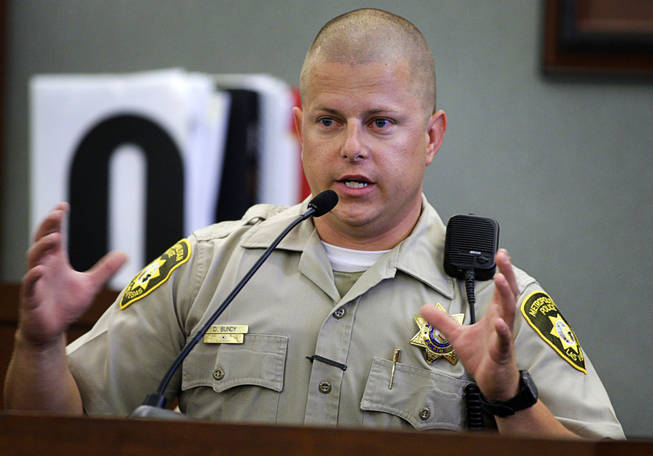
Metro Police Officer Dustin Bundy testifies during a coroner’s inquest for Erik Scott at the Regional Justice Center on Tuesday, Sept. 28, 2010.
Published Monday, Jan. 7, 2013 | 1:46 p.m.
Updated Monday, Jan. 7, 2013 | 5:24 p.m.
The Clark County Commission voted Monday to do away with the controversial coroner’s inquest process, introducing a new fact-finding process into fatal officer involved shootings.
In a 4-2 vote, the board approved a new “police fatality review process” that streamlines some elements from the previous coroner’s inquest, including doing away with a panel of members of the public that had acted as a pseudo-jury during inquests and moving the hearings out of courtrooms.
The changes also allow for fewer witnesses to be called, instead relying on reports gathered by police investigators looking into the shooting, a change critics say weakens the accountability of the process.
District Attorney Steve Wolfson said after Monday’s vote that hearings into officer involved shootings using the new process could begin as early as next month. The first hearing would be into the shooting of disabled military veteran Stanley Gibson, whose wife said he was suffering from post-traumatic stress disorder, was unarmed at the time. Gibson’s widow, Rhonda Gibson, spoke out against changes to the inquest process during Monday’s meeting.
Commissioners considered two separate items dealing with the coroner’s inquest, which has been the subject of numerous lawsuits since a new process was agreed to last year.
In October, the Nevada Supreme Court ruled the inquest process adopted by the county in 2010 was legal but said justices of the peace could not preside over the hearings.
An item proposed by Giunchigliani would have changed the coroner’s inquest into a “public review panel” and replaced justices of the peace with hearing officers; otherwise it would have left the process much the same.
The more extensive overhaul approved Monday by the commission will keep some of the same practices from the coroner’s inquest, including an ombudsman to represent on behalf of the public and the victim’s family, but it places the power to call witnesses to testify into the hands of the district attorney.
The new police fatality review process will be triggered whenever the District Attorney’s Office makes a preliminary ruling that a fatal officer involved shooting was not criminal.
Once that determination has been made, a presiding officer and an ombudsman will be chosen for the hearing and they will receive access to investigatory documents used by the prosecutor. Those documents can be shared with the victim’s families.
During the hearing, the prosecutor will make a presentation on the essential facts of the case, which may include testimony from the police officer charged with investigating the officer-involved shooting. The prosecutor may call other relevant witnesses, who can be questioned by the ombudsman and the presiding officer.
The presiding officer will also be allowed to ask questions submitted by members of the public.
Commissioners Tom Collins and Lawrence Weekly opposed the measure, with Collins pushing to delay the measure so that language could be revised and more details added to the ordinance. Commissioner Chris Giunchigliani, whose flight bound for Las Vegas was delayed with technical difficulties, was absent.
Reached by phone after the meeting, Giunchigliani said the commission’s decision Monday “watered down” the existing coroner’s inquest process that the county invested significant resources into developing and then defending in court.
She said she favored the previous coroner’s inquest process because it was developed with significant public input and provided more transparency than the new review process.
“We never gave it an opportunity to work. If there’s a flaw with what we approved in 2010, how do we know? We’ve never had a hearing. What were they trying to fix today?” she said.
Allen Lichtenstein, general counsel for the American Civil Liberties Union of Nevada, criticized the new review process as nothing more than a “glorified press conference.”
“We all lost today,” he said. “Instead of having a process that would hold police accountable, what we have is more obfuscation.”
Lichtenstein worries the new process will leave out testimony from witnesses of the shooting and rely only on input from members of the police department who put together reports on the incident.
Although the prosecutor in the hearings will have the ability to call more witnesses, Lichtenstein said he didn’t think there would be any incentive for them to do so.
Commissioner Larry Brown, who backed the changes to the inquest process, said he disagreed with criticism that Monday’s vote weakened the police department’s accountability.
“The (inquest) process doesn’t exist right now; this is to jump-start it and get it going again,” he said. “The process that we adopted today is to provide the public with information on what happened, what occurred.”
Brown said it was important to him that that there was a transparent fact-finding process that involved families of victims early on, something he thinks the changes approved Monday accomplish.

Join the Discussion:
Check this out for a full explanation of our conversion to the LiveFyre commenting system and instructions on how to sign up for an account.
Full comments policy